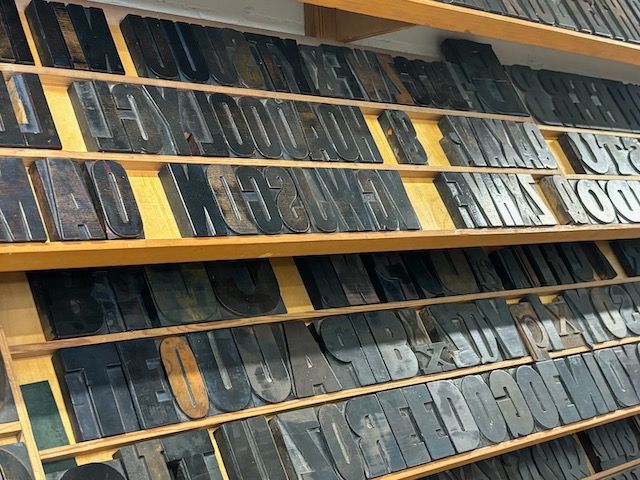Will AI replace copywriters?
I joined the British Printing Industries Federation in 1986-87, roughly around the same time offset litho printing replaced hot metal. As the Guardian recalls, many jobs were lost, but some subeditors adapted and moved from the composing room to editorial. Perhaps that’s why I think it’s unlikely that artificial intelligence (AI) will replace all copywriters.

AI will put middling copywriters under pressure. However, prestigious brands will still need top-quality copywriters who understand them and know their brand voice and what’s required to give it personality.
Copywriters’ views
Unsurprisingly, AI divides opinion among copywriters. Some are so worried that AI will replace them that they’re trying to leave the profession. Meanwhile, others are embracing it as an exciting tool that speeds up content creation and research.
We can’t afford to be luddites with so many sectors that employ copywriters now using AI. The IC Index 2024 reports that 17% of internal communications professionals use AI to create intranet articles. In March 2024, a National Audit Office AI survey found that 70% of the government bodies who responded were piloting or planning to use it.
On the other hand, many organisations are concerned about AI’s risks and the ethical and legal issues it causes.
Defining generative AI
Before we go any further, let’s establish what AI is. IBM says: “Generative AI refers to deep-learning models that can generate high-quality text, images, and other content based on the data they were trained on.”
So, Chat.ai and ChatGPT take user prompts and create content by scraping millions of web pages. They then reassemble the words to create content. You can fine-tune AI to do specific tasks like language modelling.
According to TechTarget, the first generative AI models came into use in the 1960s as chatbots. It wasn’t until other machine learning technology in 2014 that AI-generated content became more convincing.
How human copywriters outperform AI
Given how it works from (often inaccurate) existing content, AI can’t compete with a human copywriter who writes from scratch. For example, one of my recent assignments was interviewing a manufacturing client’s employees and writing articles about them. AI couldn’t have established the rapport I worked hard to gain or asked them about their backgrounds, their feelings about their jobs, what they entailed, and the challenges they faced.
But don’t take my word for people’s superiority. Let’s see what AI thinks about its abilities versus human copywriters. I asked ChatGPT/Bard for examples of where we can outperform AI. Here’s a summary:
- Interviews – AI can’t talk to people to learn about things they care about or their motivations
- Authentic storytelling – humans can add humanity, empathy and warmth to a story that AI can’t do
- Accuracy – when AI feeds back information, you can’t rely on it for accuracy
- Creativity – AI copy comes from user prompts and existing information and patterns, whereas humans have ideas that help your content to shine
- Adaptability – AI isn’t as versatile as a human copywriter in adapting to different formats and tones of voice
- Collaboration – AI can’t collaborate with other creatives to create engaging content
Here’s where copywriters can use AI
Like most copywriters, I have experimented with AI. However, I’m also wary of it because the content is neither 100% authentic nor original (and inaccuracies plague it). That said, copywriters can use AI as an assistant if they do so judiciously and sparingly.
Of course, passing off something AI writes as your own is entirely unethical (and fraudulent). But I think it’s OK to use AI if:
- You disclose that you use it and how
- You do not rely on AI to write content
And most importantly:
- You thoroughly check all the facts and sources that AI suggests.
I might use AI in ways like these without compromising my ethics :
- Asking ChatGPT for ideas if I have writer’s block (although this is rare as clients and I often discuss ideas before I start writing)
- As part of my research into subjects or trends (e.g. asking Bard what pain points marketers are experiencing for a piece on marketing)
- Digging out data, studies and quotes that I’ll fact-check elsewhere, i.e. in an authentic source like government organisations and charities
- Writing headlines and meta descriptions for comparison with mine and rewriting them to fit my needs
In editing, I will use Grammarly (an AI assistant) to do a final sweep for plagiarism in client-provided copy. If I have made multiple edits to a piece using tracked changes, I sometimes use Grammarly to check that I haven’t inadvertently added two spaces while editing.
AI copywriting risks
In my opinion, there are two significant risks to using AI as your copywriter:
1. Trust
First, there’s the significant matter of trust. Can readers trust AI-developed materials? No. Gen AI is often inaccurate and can’t be relied upon as your only source of information. Of 4,000 UK employees interviewed for the IC Index, 33% said they ‘would not trust at all’ a communication from their CEO or most senior leader if AI helped to create it.
Similarly, in a recent AI Authority Hacker survey, 63% of respondents had spotted inaccuracies and bias in AI-generated content. It argues that fact-checking must be robust when using AI for content creation. Like other journalism-trained writers, I’m also a sub-editor and proofreader. So, I’ll check a fact using at least three different but authoritative sources, such as the NHS, BBC Verify, Associated Press or Full Fact.
2. Detection
Second, it could seriously compromise trust in a brand if an organisation overuses AI and ignores content’s integrity and quality. It carries the potential risk of penalties from Google if created specifically to manipulate rankings in search results, says luxury digital marketing agency Relevance.
In light of these issues, AI detection software has risen in importance. Tools like writer.com’s free AI detector, Scribbr for academic texts, and undetectable.ai detect AI-manipulated text vs genuine copy. An example might be journalists investigating whether something is fake news or a marketing client checking whether a human copywriter or AI created your content.
Remember, these tools are helpful, but they aren’t always 100% accurate. Through one detector, I ran a blog I’d written in 2015, well before ChatGPT. It said it was 95% written by a human! I assure you, categorically, it was all mine.




